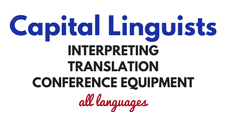Let’s imagine a conference hall filled with the leading thinkers and pioneers of innovative scientific procedures coming together from various corners of the world to exchange best practices. Medical and pharmaceutical conferences allow scientists and professionals from all over the world to meet, converse and debate recently developed ideas and discoveries. Medical societies and organizations normally hold conferences, webinars, trainings, and symposiums, among many other types of events. These events attract doctors and scientists with all kinds of specialties, to discuss and present their research on a variety of topics, such as new pharmaceutical developments; research breakthroughs and best practices. While the participating experts may be able to communicate in English to some degree, the conversation would be stilted and not as rich as if they were participating in their own languages. This is where language interpreters step in.
Where conference and medical interpretation intersect
Medical and pharmaceutical experts use very specific terminology. During a medical visit, you’ll notice this when the medical provider is trying to explain something important to you, but all you hear are the medical terms that you can’t quite understand. During a conference where experts are presenting on the latest innovations and discussing cases with other experts, the attention to technical details increases as does the use of industry-specific jargon and acronyms. If we add a language barrier when hosting international conferences with experts from a variety of countries in attendance, we need to ensure that experts are able to understand the message as conveyed originally in their language. Unsurprisingly, experienced conference interpreters contribute greatly to the success of international medical and pharmaceutical meetings. The interpreters must be able to understand and translate medical terms and concepts with the same comprehension and precision as the experts themselves in order to faithfully transmit the message into the other language. The skill set needed for conference interpreting is unique and requires more than just the ability to speak several languages. Developing this skill set normally takes years of specialized education and training. Many interpreters attain master’s degrees in Conference Interpretation as part of the process to hone their skills. They must also be well versed in the ins and outs of the topic and equipped with the right terminology and skills.
Events with diverse stakeholders and high-level topics
Similar to medical and pharmaceutical conferences, negotiations for Pharma market access are another example among many high-stakes meetings where interpreters play a pivotal role in ensuring that all participants involved understand the scientific and financial information, as presented, irregardless of their language. There’s a lot of data being presented with a potential contract at stake. Interpreters are there to successfully overcome linguistic and cultural barriers, and make sure that everyone is able to equally participate in the meetings.
As an event planner or leader, you’ve planned your meeting to increase participant engagement and achieve your intended results. Interpretation is key for this. The interpreters will be your allies in ensuring that your message is understood clearly.
Finding the right interpreters for your medical or pharmaceutical event
When selecting interpreters for clinical trials, trainings for visiting clinicians and specialists, meetings of medical organizations and similar events, it is necessary to note that the interpreters selected should be highly trained and familiar with the medical or pharmaceutical topics to be discussed.
You can count on Capital Linguists to help ensure the interpreters are a good fit
Capital Linguists will select interpreters from their highly-qualified linguist pool that match your project’s unique needs. We will take into consideration the experience of the interpreter and their familiarity with the medical and pharmaceutical topics to ensure they can deliver the best service for your event. Known for their rich knowledge and experience, our linguists provide seamless interpretation while remaining ethical and observing strict client confidentiality. While this is true for any field, we understand this is of upmost importance in the healthcare field. Capital Linguists will also provide guidance on which mode of interpretation (consecutive, whispering or simultaneous) would be best for your event based on the physical setting or remote platform, the number of participants and the intended purpose of the event. We will be your partners in ensuring that your event is successful.
What about document translation for your medical or pharmaceutical event?
Just like interpretation, translation also has a number of specialties, including scientific, medical and pharmaceutical content. While sign language and spoken language interpreters will ensure that the spoken communication during the event is accessible to all participants, translators are key for ensuring your stakeholders remain engaged throughout the process. Clinical trial results, scientific studies, and training and compliance documents are among some of the materials that may need translation. You can contact Capital Linguists for further guidance on how to ensure all of your materials are translated into the languages needed.
